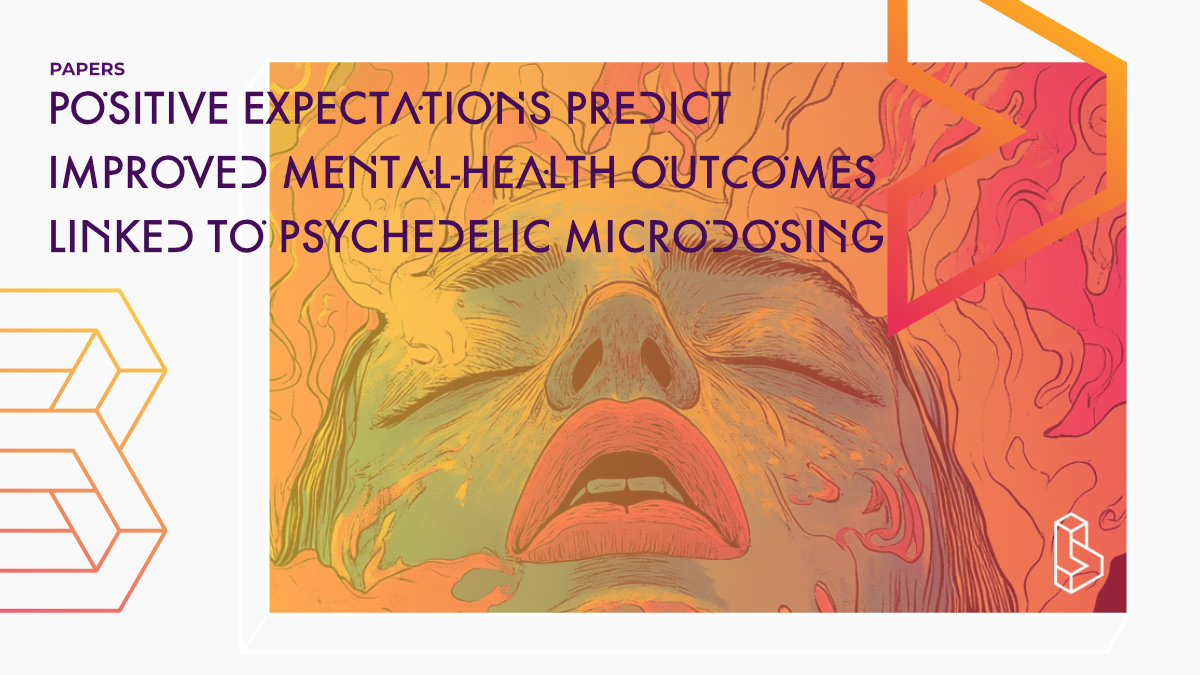This prospective survey study (n=81) found that expectancy effects were mostly predictive of microdosing outcomes on reductions in state anxiety, depressive symptoms (at 4-week endpoint), and positive outcomes (e.g. psychological resilience, -connectedness, -flexibility).
Abstract of Positive expectations predict improved mental-health outcomes linked to psychedelic microdosing
“Psychedelic microdosing describes the ingestion of near-threshold perceptible doses of classic psychedelic substances. Anecdotal reports and observational studies suggest that microdosing may promote positive mood and well-being, but recent placebo-controlled studies failed to find compelling evidence for this. The present study collected web-based mental health and related data using a prospective (before, during and after) design. Individuals planning a weekly microdosing regimen completed surveys at strategic timepoints, spanning a core four-week test period. Eighty-one participants completed the primary study endpoint. Results revealed increased self-reported psychological well-being, emotional stability and reductions in state anxiety and depressive symptoms at the four-week primary endpoint, plus increases in psychological resilience, social connectedness, agreeableness, nature relatedness and aspects of psychological flexibility. However, positive expectancy scores at baseline predicted subsequent improvements in well-being, suggestive of a significant placebo response. This study highlights a role for positive expectancy in predicting positive outcomes following psychedelic microdosing and cautions against zealous inferences on its putative therapeutic value.”
Authors: Laura S. Kaertner, Michael B. Steinborn, Hannes Kettner, Meg J. Spriggs, Leor Roseman, Tobias Buchborn, Maria Balaet, Chris Timmermann, David Erritzoe & Robin L. Carhart-Harris
Notes on Positive expectations predict improved mental-health outcomes linked to psychedelic microdosing
“The current study provides the first prospective exploration of microdosing in naturalistic settings and is, to our knowledge, the first to highlight the role of positive expectations in predicting pertinent psychological outcomes linked to psychedelic drug use.”
The study found that expectancy effects (at the start) were significantly associated with changes in well-being, depressive symptoms, and anxiety scores.
Unfortunately, there weren’t enough participants at the six- and twelve-month post-microdosing moment to provide enough data to also say something about the long-term effects of microdosing.
“In the specific context of microdosing (but also more generally), we would hypothesise that expectations of impending drug effects may sensitise people to perceived changes in their conscious experience (whether ‘real’ or imagined).”
The authors also note that microdosing may function as active placebos, amplifying (positive) expectations by increasing (brain) plasticity. The authors also note that the pharmacological effects of microdoses are really doing something (vs being too low to actually have influence). Still, this may not be the main way through which they serve as (active) placebos.
Future studies on microdosing psychedelics could: “[include] appropriate active placebos that successfully maintain the integrity of study blinds … Combining subjective measures with objective physiological ones, using a multi-method approach … Venturing into clinical populations rather than using samples of healthy volunteers, where there may be comparatively less scope for meaningful psychological change, is another worthy consideration.”
Summary of Positive expectations predict improved mental-health outcomes linked to psychedelic microdosing
Classic tryptamine psychedelics induce their distinct psychological and physiological effects mainly through agonism of the 5-HT2A receptor. Microdosing is a popular practice that involves taking a psychedelic every third or fourth day over a period of a few weeks.
Microdosing is a phenomenon that has been brought into prominence by James Fadiman (2011), followed by expanding internet community interest9,10. It is a way of mitigating some of the perceived psychological challenges and risks associated with higher doses of psychedelics.
Observational studies and open-label studies have found that microdosing psychedelics can have positive effects on psychological functioning and well-being. However, placebo-controlled studies have failed to find compelling evidence for beneficial effects of microdoses on cognition or mood.
Placebo effects can be important in psychedelic microdosing studies, as they can affect various outcomes. Positive media coverage of the topic may also contribute to a positive bias in expectations about a treatment.
Find this paper
Positive expectations predict improved mental-health outcomes linked to psychedelic microdosing
https://doi.org/10.1038/s41598-021-81446-7
Open Access | Google Scholar | Backup | 🕊
Cite this paper (APA)
Kaertner, L. S., Steinborn, M. B., Kettner, H., Spriggs, M. J., Roseman, L., Buchborn, T., ... & Carhart-Harris, R. L. (2021). Positive expectations predict improved mental-health outcomes linked to psychedelic microdosing. Scientific reports, 11(1), 1941.
Study details
Topics studied
Anxiety
Microdosing
Depression
Study characteristics
Survey
Participants
81
Humans
Authors
Authors associated with this publication with profiles on Blossom
Leor RosemanLeor Roseman is a researcher at the Centre for Psychedelic Research, Imperial College London. His work focussed on psilocybin for depression, but is now related to peace-building through psychedelics.
Chris Timmermann
Chris Timmerman is a postdoc at Imperial College London. His research is mostly focussed on DMT.
David Erritzoe
David Erritzoe is the clinical director of the Centre for Psychedelic Research at Imperial College London. His work focuses on brain imaging (PET/(f)MRI).
Robin Carhart-Harris
Dr. Robin Carhart-Harris is the Founding Director of the Neuroscape Psychedelics Division at UCSF. Previously he led the Psychedelic group at Imperial College London.
Institutes
Institutes associated with this publication
Imperial College LondonThe Centre for Psychedelic Research studies the action (in the brain) and clinical use of psychedelics, with a focus on depression.

